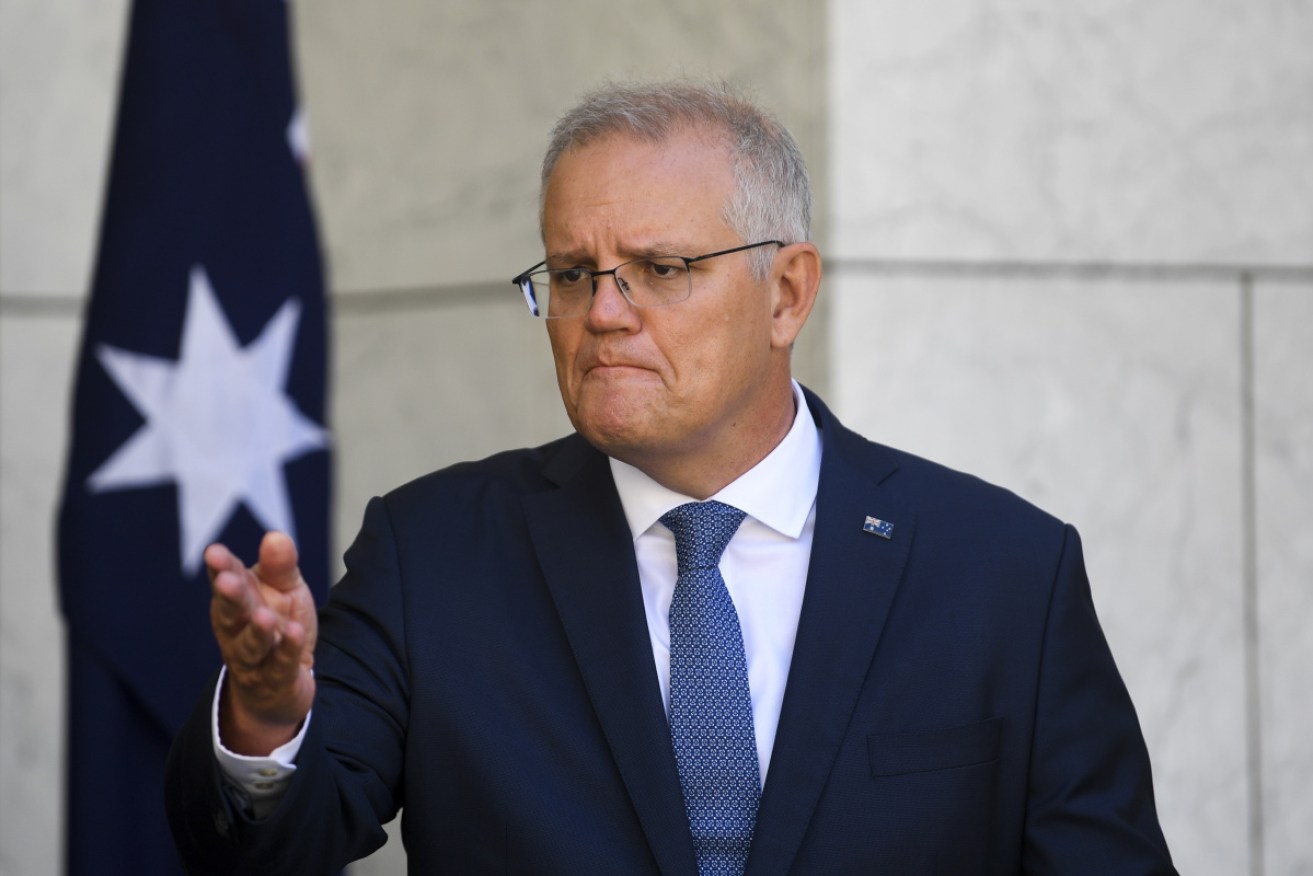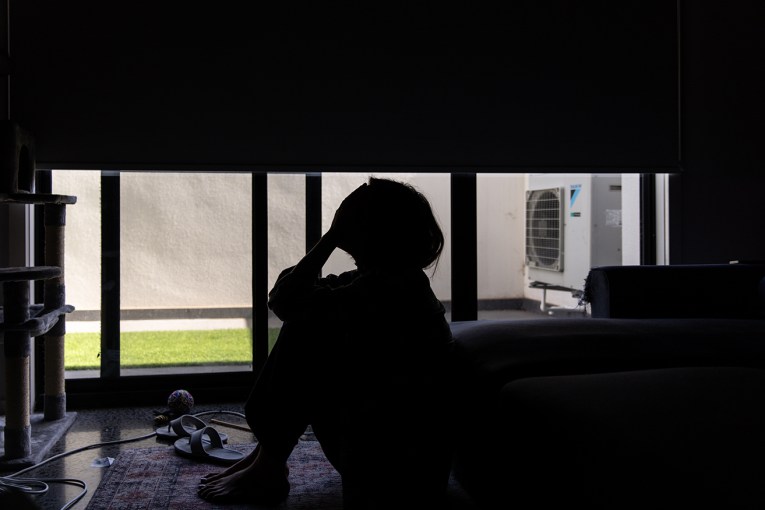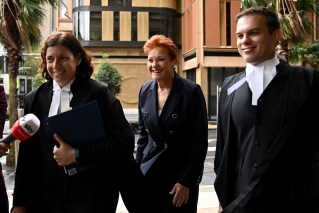Scott Morrison pivots back to ‘freedom’ rhetoric after ‘let it rip’ criticisms


Scott Morrison has refused to elaborate on what aid Australia might provide to Ukraine. Photo: AAP
Scott Morrison has incorrectly insinuated that Labor supported a return to COVID-19 lockdowns, a day after Opposition Leader Anthony Albanese accused the Prime Minister of presiding over a “let it rip” approach to the virus.
Under pressure from surging COVID-19 cases and associated problems from supermarket supply to workforce shortages, Mr Morrison on Monday returned to previous campaign rhetoric about “pushing through” the COVID crisis, even as state premiers started reimposing restrictions on hospitality and entertainment.
“I agree with the advice that we’re receiving, that we need to keep pushing through,” the PM said in Canberra.
Australia reported more than 71,000 COVID cases on Monday, with 18 deaths in New South Wales alone – the state’s highest daily toll of the pandemic.
The Prime Minister admitted Omicron was moving faster than “our early estimates”, saying the variant’s “rate of escalation has been very strong”.
Albanese’s ‘let it rip’ attack
Speaking in Queensland on Sunday, Mr Albanese accused the federal government of a “failure to plan” for “major issues in our health system” as a result of the fast-rising COVID cases, raising questions over vaccine availability, the booster rollout in aged-care homes, and the furloughing of sick workers.
“The ‘let it rip’ approach is tearing communities apart,” the Labor leader said.
“There are major issues with the pressure on the hospital systems. And that’s a direct result of some of the attitudes of the NSW government and the federal government.”
Mr Morrison rejected the claims on Monday, saying that was “not the approach that the government is taking”.
“I’d describe it more, as I said before, as pushing through. We do have public health social measures in place. We do have other restrictions that are in place. But we also have a very practical understanding of how the Omicron variant works,” the PM said in Canberra.
“If Mr Albanese thinks that the answer is to put Australia back into lockdown, then I don’t agree … if Labor are for lockdowns, that’s for them. My government is for keeping Australia open and pushing through.
“You have two choices here. You can push through or you can lock down.”
However, Mr Albanese has not called for lockdowns.
Indeed, Mr Morrison’s insinuation that lockdowns are the only alternative to the current approach flies in the face of new restrictions imposed in NSW and Victoria, where minor rules have been imposed on hospitality and entertainment but the venues have remained open.
Tweet from @AlboMP
Election ‘freedom’ pitch
Mr Morrison has previously criticised calls for COVID reopenings to be slowed or stalled, suggesting that rhetoric around “freedom” from lockdowns may feature in the Coalition’s election pitch this year.
At his press conference on Monday, the Labor leader did not repeat his “let it rip” attack, but defended his claim by mentioning reported issues with vaccine bookings, grocery shortages, workforce absences and the availability of rapid antigen tests.
Labor has continued to push its calls for free rapid antigen tests for all, a suggestion still resisted by the Coalition.
“He needs to get out more, this Prime Minister, because he lives in a place whereby everything’s fine, and everything’s hunky dory,” Mr Albanese said.
“This Prime Minister needs to stop pretending that there aren’t issues here. He did that last time around with the rollout.”
Mr Albanese denied he was in favour of further lockdowns.
“No one wants any restrictions to be in place for one day more than necessary. No one wants COVID to exist. Everyone wants life to go back to normal. But what keeps happening is that reality catches up with rhetoric,” he claimed.
Mr Morrison defended the federal approach, saying the current wave of the Omicron variant “works very differently to the Delta strain”.
“I agree with the advice that we’re receiving that we need to keep pushing through, and I’d encourage Mr Albanese to seek a briefing with the health authorities,” he said.
“What we’re doing is sensibly listening carefully to the medical advice that we’re receiving and we’re ensuring that Australia can keep moving forward.”

Like NSW, the Victorian government under Health Minister Martin Foley has reintroduced modest restrictions to curb the rate of transmission. Photo: AAP
States in control
Mr Albanese said he had two conversations with vaccine rollout co-ordinator Lieutenant General John Frewen in recent days, and was in contact with “all the health officials, on a regular basis”.
On Monday, Mr Albanese criticised the approach of the NSW government in his “let it rip” claims.
Premier Dominic Perrottet, whose decision to abolish mandatory QR code check-ins and indoor mask rules was met with raised eyebrows by public health experts last year, reintroduced rules banning singing and dancing in hospitality on Friday, as well as asking citizens to “minimise mingling” and household visits.
Similar rules were introduced in Victoria on Monday.
But Mr Albanese is also guilty of a bit of fudging.
As Prime Minister in the Commonwealth government, Mr Morrison has no power to impose or remove mandates in state jurisdictions – and if Mr Albanese were PM, he would only be able to influence some of those decisions made at the state level or at national cabinet.
Indeed, state premiers have shown they will regularly and happily defy Mr Morrison’s requests to wind back rules or hold off on imposing new ones.
As shown recently in the pre-Christmas reimposing of indoor mask rules in Sydney and Melbourne, and this week’s new restrictions on hospitality and entertainment, state premiers have made clear they will not be beholden to the rhetoric from Canberra.
Despite admitting Omicron had moved faster that expected, Mr Morrison said he was optimistic Australia’s case numbers would stabilise.
“We’re seeing the Omicron variant peak in a number of other countries, particularly in major cities like London. There’s the suggestion – well more than a suggestion – that people in South Africa, that they’ve peaked there and and we will have a similar experience,” he said.
“And so you push through. You don’t lock down.”








